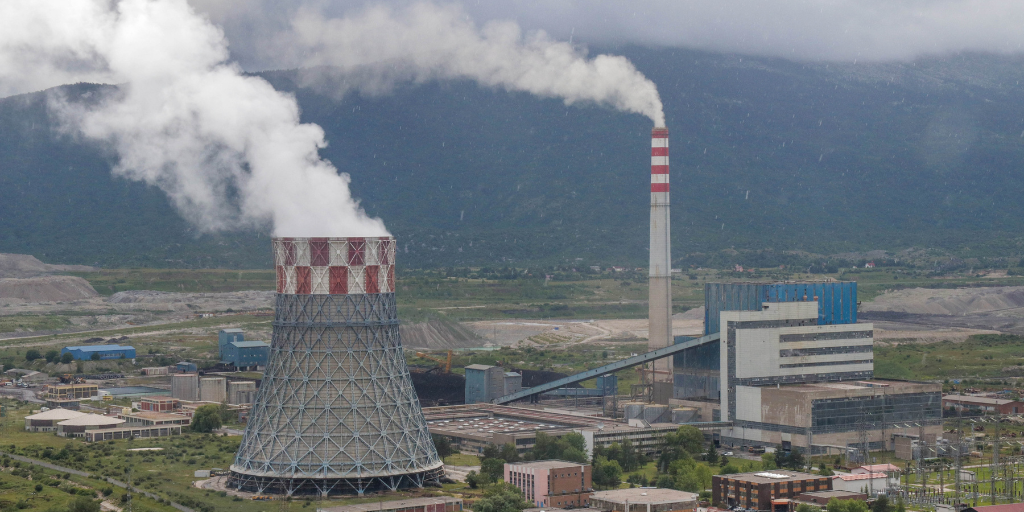Western Balkan coal pollution still massive, illegal and deadly – new report
In 2021, Western Balkan coal plants flagrantly breached air pollution legislation under the Energy Community Treaty for the fourth year in a row, emitting five times as much sulphur dioxide and 1.8 times as much dust as allowed, according to a report released today by CEE Bankwatch Network.
21 June 2022

Credits: Center for Environment
The entry into force of new legal standards on 1 January 2018 should have brought reductions in deadly air pollution. But the report – Comply or Close – shows that in 2021, dust emissions from coal plants included in the National Emissions Reduction Plans (NERPs) of Bosnia and Herzegovina, Kosovo, North Macedonia and Serbia increased compared to previous years, while sulphur dioxide emissions only decreased slightly.
The Ugljevik coal plant in Bosnia and Herzegovina again emitted the most sulphur dioxide in the region in 2021 – 86 774 tonnes – despite having desulphurisation equipment installed at a cost of EUR 85 million. (1) Its emissions were similar to 2019, so even two years after testing began, the desulphurisation equipment clearly did not work.
The highest dust polluter in 2021 was Gacko in Bosnia and Herzegovina, whose emissions more than tripled to 4 960 tonnes in 2021 – more than 16 times as much as allowed by the country’s NERP. The reasons for this massive increase are unclear.
The Pljevlja coal plant in Montenegro also breached the Energy Community Treaty in 2021 by operating for more than 20 000 hours from 1 January 2018 without undertaking pollution control investments. (2)
The year ended with a region-wide energy crisis with coal supply problems and coal plants in Serbia, North Macedonia and Kosovo collapsing one after another. Coupled with poor hydrological conditions and high electricity import prices, this diverted attention from tackling pollution and in early 2022 provided a pretext for the Federation of Bosnia and Herzegovina to approve an illegal lifetime extension for the Tuzla 4 and Kakanj 5 units and for North Macedonia to start up an ancient oil-fired plant again after being in reserve for years. (3)
Ioana Ciuta of CEE Bankwatch Network – ‘Western Balkan governments are reacting to the energy crisis by opening new coal mines (4) and delaying power plant closures, but with such antiquated plants, the end of coal is closer than they think. A plan B is urgently needed – cutting energy wastage, opening markets and ramping up development of sustainable forms of renewable energy – but governments must take measures to cut pollution and save lives in the meantime.’
Pippa Gallop of CEE Bankwatch Network – ‘In 2021 the Energy Community Secretariat opened dispute settlement cases against Bosnia and Herzegovina, Kosovo, Montenegro, North Macedonia and Serbia but this has not been sufficient to spur them into action. The European Commission must redouble efforts to introduce deterrent penalties into the Energy Community Treaty if it wants Western Balkan governments to take EU law and human health seriously.’
The report findings, as well as additional context, can be found at https://www.complyorclose.org
Contacts
Pippa Gallop
Southeast Europe Energy Advisor, CEE Bankwatch Network
pippa.gallop@bankwatch.org
+385 (0)99 755 9787
Twitter: @pippagallop
Ioana Ciuta
Energy coordinator for the Western Balkans, CEE Bankwatch Network
ioana.ciuta@bankwatch.org
+40724020281
Twitter: @unaltuser
Davor Pehchevski
Balkan Air Pollution Campaign Coordinator, CEE Bankwatch Network
davor.pehchevski@bankwatch.org
+38971264087
Twitter: @dpehche
Notes for editors
(1) For more information about the Ugljevik coal plant, see here.
(2) For more information about the Pljevlja coal plant, see here.
(3) A statement by the Energy Community on Tuzla 4 and Kakanj 5 is available here.
(4) For example, North Macedonia has recently announced the opening of two new coal mines – Zivojno and Gusterica and Montenegro plans to open open-cast mines at Glisnica and Mataruge.
Never miss an update
We expose the risks of international public finance and bring critical updates from the ground – straight to your inbox.
Institution: EU
Theme: Coal
Location: Western Balkans
Project: Coal in the Balkans
Tags: air pollution in the Western Balkans | coal in the Western Balkans | coal phase out
